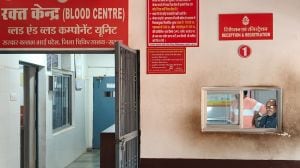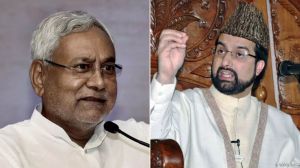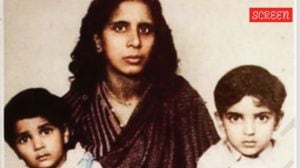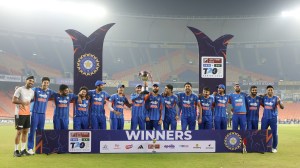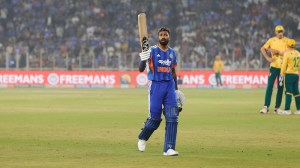The Bombay High Court on Wednesday (December 13) directed the Election Commission of India (ECI) to immediately conduct a bypoll for the Pune Lok Sabha constituency. The Pune seat had become vacant after the death of BJP MP Girish Bapat on March 29.
A division Bench of Justice Gautam S Patel and Justice Kamal R Khata pulled up the poll body for “abdication of its constitutional duties”.

What was the petition?
Sughosh Joshi, a 25-year-old law graduate and resident of Kothrud area, a registered voter in the Pune parliamentary constituency, approached the High Court on November 7. He challenged a certificate issued by the ECI on August 23, stating that it was facing “difficulty” in holding the Pune bypoll. Joshi had availed the certificate through an RTI application.
Joshi argued that as per section 151A of the Representation of People Act (RoPA), 1951, a Parliamentary vacancy should be filled within six months through a bypoll, and going by this, the Pune election should have been held by September 28.
Joshi claimed that the constituents had had no voice in Parliament over the past few months, especially over issues related to significant delays in several developmental projects in Pune. He also sought that the certificate issued by ECI be quashed and declared unconstitutional.
How did ECI respond?
The ECI argued that Joshi had no locus standi (legal standing) to file a writ petition and instead he could have filed a PIL.
The poll body reasoned that in case bypolls are held, the returned candidate would hardly have three-four months to work as an MP.
Story continues below this ad
It further argued that it had a “genuine difficulty” in conducting the bypoll as its whole machinery was far too busy with preparations for Lok Sabha elections 2024.
What the RoP Act, 1951 say about time limit to fill vacancies?
Section 151A of RoPA prescribes that the by-elections shall be held within a period of six months from the date of the occurrence of the vacancy.
The first exception to this is provided under section 151A (a), which says that the six-month rule will not apply when the remainder of the Parliament term is less than one year.
Story continues below this ad
Another exception under section 151A (b) to not hold bypolls is consultation between EC and the Central government, certifying ‘difficulty’ to hold the same within six months.
What did the Bombay HC hold?
The High Court held that the petitioner had a locus to file a writ petition being a voter of the said constituency and that the ECI’s powers were never ‘unbridled or exempted’ from judicial review.
The High Court further noted “constituencies cannot remain unrepresented beyond a defined period”, and the same is “wholly unconstitutional”
It observed that the term of the incumbent Lok Sabha would end on June 16, 2024 and the Pune LS seat had been vacant since March 29, 2023, therefore the first exception under section 151A would not apply.
Story continues below this ad
Justice Patel said the “ECI is not concerned with whether the returned candidate will or will not be effective in the term that remains”, and it should only function within a principle of “right to representation”.
What did the HC say about the find ECI’s ‘too busy’ argument?
Notably, the HC termed the ECI’s argument on “difficulty” to conduct the bypoll due to preparations for the 2024 General Elections as “one that borders on the bizarre” and amounting to “sabotaging the entire constitutional democratic framework.”
The HC noted that the ECI’s stand was “inconsistent”, as it had conducted several polls since the Pune seat fell vacant. It added that “adminisitrative preoccupation” or “burden on the exchequer” cannot be reasons to refuse bypolls.
Story continues below this ad
What did the HC say about Centre’s response to ECI’s consultation?
The ECI consulted with the Union Law and Justice department on August 11 and the Centre responded on the same date. “We have not known governments to be able to consult, deliberate, and act with such extraordinary despatch. This correspondence reveals no underlying material,” the HC remarked.
What about the ECI’s claim that the certificate to not hold bypolls was an internal communication?
The High Court rejected the ECI’s submission that the certificate referring to the “difficulty” in holding elections can be kept as an internal document and need not be communicated to the electorate.
Story continues below this ad
“An electorate cannot be left in a sense of wonderment as to whether an election is going to be held, not going to be held, or, if it is not going to be held, why it is not going to be held when there is an established right to vote for an elected representative,” the Bench noted.
What next?
While the High Court has directed the ECI to immediately proceed to take all steps to hold election for the Pune LS seat, it has a legal remedy to challenge the HC’s decision before the Supreme Court, citing that merely few months are left for the 2024 General elections.
How many Lok Sabha seats are vacant right now?
Eighteen Lok Sabha seats are currently vacant. Of these, 13 seats — 11 held by the BJP, and two by the Congress — were vacated this month by legislators who contested and won in the recently concluded state Assembly elections. Notable in this list are Rajasthan’s Mahant Balaknath and Diya Kumari, MP’s Narendra Singh Tomar, Chhattisgarh’s Arun Sao (all BJP), and Telangana Chief Minister Revanth Reddy (INC).
Of the remaining 5 vacant Lok Sabha seats, three, were vacated between March and May this year due to untimely deaths. These include Girish Bapat’s Pune seat, Balu Dhanorkar’s (Congress) Chandrapur seat, and Ratan Lal Kataria’s (BJP) Ambala seat.
Story continues below this ad
BSP leader Afzal Ansari’s Ghazipur seat was vacated on May 1, after he was sentenced to four years in prison. And finally, TMC’s Mahua Moitra vacated her Krishnanagar seat after being expelled from the Lok Sabha for her alleged involvement in a ‘cash-for-query’ scam.














